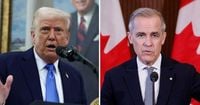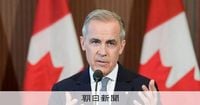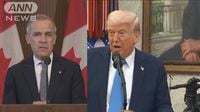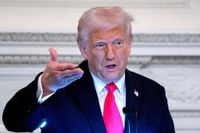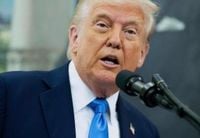On March 28, 2025, U.S. President Donald Trump engaged in a significant phone conversation with Canadian Prime Minister Mark Carney, marking their first direct communication since Carney took office on March 14. The discussion, which both leaders described as productive, set the stage for a meeting scheduled to take place after the Canadian general election on April 28, 2025. The two leaders aim to address pressing political and economic issues that have arisen amid escalating tensions over tariffs.
Trump characterized the call as 'extremely productive', stating on his social media platform, Truth Social, that he and Carney found consensus on many points. He expressed optimism about the potential outcomes of their future discussions, asserting, 'We will meet after the election in Canada to address politics, business, and all other issues. I think it will bring good results for both the U.S. and Canada.'
In contrast, Prime Minister Carney conveyed a more cautious stance during a press conference in Montreal following the call. He reiterated that the relationship between Canada and the United States, traditionally characterized by deep economic integration and security cooperation, has fundamentally changed. Carney noted, 'The old relationship with the United States is over,' emphasizing that Canada is prepared to implement retaliatory tariffs to protect its workers and economy should the U.S. proceed with its planned tariffs.
According to the Canadian Prime Minister's office, Carney informed Trump that if the U.S. introduces additional tariffs on April 2, 2025, Canada would respond with countermeasures. This warning comes as the U.S. administration has already announced a 25% tariff on certain imports from Canada and plans to impose a similar tariff on vehicles imported from all countries, including Canada, starting April 3.
During the call, both leaders agreed to initiate comprehensive negotiations on economic and security relations immediately after the Canadian election. The Canadian government aims to diversify its trade partnerships and reduce reliance on the U.S. market. In line with this strategy, Carney announced plans to establish a 50 billion Canadian dollar fund to enhance infrastructure development in ports and railways.
Despite the looming tariff war, Trump expressed a desire to foster a positive relationship with Canada. He refrained from using aggressive rhetoric that characterized his previous comments on Canada, such as calling it the '51st state of America.' Instead, he focused on the potential for collaboration, stating, 'I think things will go very well between Canada and the United States.'
The backdrop of this diplomatic exchange is a complex trade relationship that has seen significant strain in recent months. Carney's administration has been vocal about its intention to reassess Canada’s trade dependencies and strengthen its economic autonomy. The Prime Minister's statements reflect a broader strategy to reposition Canada in the global market, especially in light of the increasing unpredictability of U.S. trade policies.
As both nations prepare for the upcoming discussions, the stakes are high. The Canadian election will be pivotal, not only in terms of domestic politics but also for the future of U.S.-Canada relations. The outcome could influence the tone and content of the negotiations that follow, particularly regarding tariffs and trade agreements.
In summary, the recent phone call between Trump and Carney signifies a crucial moment in U.S.-Canada relations. With both leaders agreeing to meet post-election, the potential for a new chapter in their bilateral relationship looms large, albeit against a backdrop of tariffs and trade tensions. As Carney remarked, the conversation was 'very constructive', yet the road ahead will require careful navigation to avoid further escalation of conflicts.
